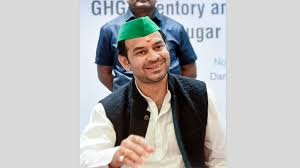‘Marrying multiple times accepted in Hindu traditions… not a crime’: Tej Pratap gets backing of RJD MP Sudhakar Singh

Tej Pratap Yadav, the elder son of Rashtriya Janata Dal (RJD) supremo Lalu Prasad Yadav, recently found himself at the center of a heated controversy. The issue? His personal life and multiple relationships. RJD Member of Parliament Sudhakar Singh stepped forward to defend him. Singh said marrying multiple times is not a crime but a tradition that Hindu society has accepted historically. His comments sparked debate about culture, personal freedom, and politics in India.
The Controversy Surrounding Tej Pratap Yadav
Tej Pratap Yadav shocked many when he revealed a 12-year relationship with a woman named Anushka Yadav. This happened despite his legal marriage to Aishwarya Rai. Although he filed for divorce in 2018, it was not finalized when he made this revelation. Lalu Prasad Yadav reacted strongly. He expelled Tej Pratap from the RJD and disowned him from the family. He claimed Tej Pratap’s actions violated family and party values.
The controversy quickly moved beyond family drama. It ignited discussions about marital norms and individual choices in India.
Sudhakar Singh’s Bold Support
Sudhakar Singh publicly supported Tej Pratap. He argued that multiple marriages are neither immoral nor illegal. He pointed out that Hindu traditions have accepted multiple marriages for centuries. Singh mentioned the late Union Minister Ram Vilas Paswan, who had two wives, as an example. He said society tolerated such arrangements without labeling them immoral.
Singh also referred to socialist thinker Dr. Ram Manohar Lohia. Lohia believed all consensual relationships between adults are valid, except those involving deception or harm. Singh urged Lalu Prasad Yadav to reconsider his decision. He emphasized that marriage is a personal matter and not a crime.
Historical and Cultural Context
Sudhakar Singh’s claim that Hindu traditions accept multiple marriages has some historical backing. Ancient Hindu texts and practices mention polygamy, especially among kings, warriors, and wealthy men. People saw it as a way to build alliances and secure heirs. Epic stories like the Mahabharata and Ramayana mention multiple marriages without judgment.
The Manusmriti, an ancient Hindu law text, outlines rules for multiple wives but prefers monogamy for common men. Over time, social reforms and legal rules changed this. The Hindu Marriage Act of 1955 legally made monogamy mandatory for Hindus.
Still, memories of multiple marriages linger in some communities, especially rural ones. Singh’s statement highlights this complex cultural history.
Legal Perspective on Multiple Marriages
The Hindu Marriage Act forbids bigamy. Marrying someone else while still married is illegal for Hindus. Exceptions exist for other communities with different personal laws. Tej Pratap’s case falls in a gray area. Since he had filed for divorce, his relationship with Anushka is not strictly illegal, though the divorce was not finalized.
Singh focuses on moral and cultural acceptance instead of legal issues. He calls for society and families to accept diverse personal choices.
Political and Social Implications
This controversy reveals tensions within the RJD and the Yadav family. Personal choices and politics are closely linked here. Lalu Prasad Yadav’s tough stance reflects his desire to maintain family and party discipline. It also appeals to voters who value traditional family values.
Sudhakar Singh’s defense exposes internal party divisions. It reflects a clash between older and younger generations and between conservative and progressive ideas.
The debate also resonates with wider social changes. India is becoming more urban and exposed to global ideas. Gender roles and relationship norms are evolving. Singh’s support for Tej Pratap aligns with calls for greater personal freedom. It challenges the stigma around multiple marriages and long-term relationships outside formal marriage.
Socialist Thought and Personal Relationships
Singh’s reference to Dr. Ram Manohar Lohia brings a progressive view. Lohia emphasized consent and respect in relationships over strict social rules. He opposed moral policing of personal lives. This philosophy encourages empathy and respects individual dignity.
This approach questions how families, communities, and parties control private lives. It calls for acceptance of diverse choices.
Conclusion: Balancing Tradition, Law, and Freedom
The Tej Pratap Yadav controversy shows how marriage norms clash in modern India. Legal rules promote monogamy, but culture and personal freedom create a complex picture. Sudhakar Singh’s defense reminds us to respect personal choices. He calls on families and leaders to be more understanding.
This case could spark wider discussions about marriage laws and societal attitudes. India’s cultural diversity demands a more inclusive view of relationships.






